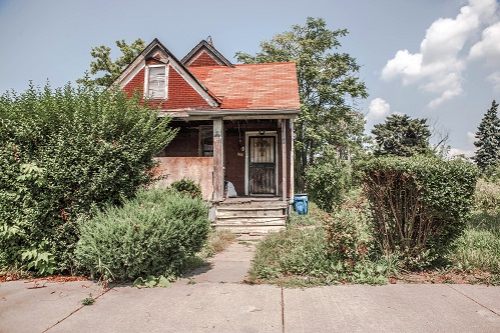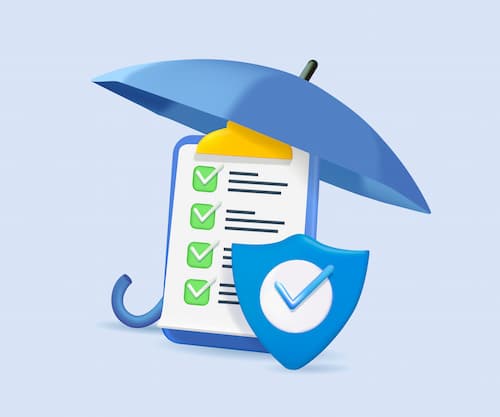- What is a home insurance inspection?
- How to prepare for a home insurance inspection
- What do home insurance inspectors look for?
- How often do insurance companies inspect homes?
- What will cause you to fail a home insurance inspection?
- Can you get home insurance without an inspection?
- Frequently Asked Questions
What is a home insurance inspection?
A home insurance inspection differs from a home inspection when buying a house. During the home-buying process, an inspection is completed to look for any problems with the house, such as a leaky roof, cracked foundation or HVAC issue, that you should know about before buying the house.
A home insurance inspection is similar, but your insurer decides if it is necessary. Additionally, your insurer may require an inspection even if you aren’t buying a house. For example, you may have to undergo an inspection if you haven’t had one recently, change insurers, complete a major remodel or renew your policy.
A home insurance inspection helps your insurer determine the likelihood that you will file a claim. As with a buyer inspection, inspected items include the roof, basement, electrical system and plumbing. An inspector also looks for water damage and animal infestations.
The inspection results may impact homeowners insurance rates. For example, rates will increase if you have an older roof. On the other hand, if you’ve just replaced your roof, your premiums will go down.
How to prepare for a home insurance inspection
As a homeowner, you play a crucial role in this process. Proactively preparing your home for inspection and addressing potential risks or issues can positively impact your insurance rates or prevent a nonrenewal.
Items to check or fix before a home insurance inspection include:
- Roof: Check for missing shingles, debris, gutter clogs and cracks in the roof and chimney.
- Systems: Inspect HVAC, electrical and plumbing systems and make necessary repairs.
- Basement: Look for foundation cracks, mildew or mold.
- Attic: Check for cracks, water damage and animal infestations.
- Walls: Look for water damage and cracks indicating leaks and foundation issues.
- Windows and doors: Check for broken seals and locks.
- Safety and security systems: Check alarms, smoke and carbon monoxide detectors and fire extinguishers.
- Trees and bushes: Look for any trees or branches that are at risk of falling; if you live in a wildfire-prone area, clear bushes and debris from around your home to create defensible space.
Proactively making repairs or updates to your home and keeping it well-maintained lowers insurance rates and reduces the risk of being turned down for insurance coverage.
What do home insurance inspectors look for?
Home insurance inspectors look for potential risks or issues with your home for your insurance company. They identify problems that may result in a claim down the road.
“Many inspections are now completed through third-party technology such as satellite images (Cape Analytics). It’s becoming less common for insurers to send an inspector to inspect a risk personally. When this happens, insurers are typically interested in roof condition (signs of age or streaking on the shingles). Also commonly noted are any trees which may have overhanging limbs near the roof,” Mississippi Insurance Commissioner Mike Chaney says.
“Additionally, insurers like to see a home that’s well maintained since that’s a sign of pride of ownership. Homeowners need to understand that when their home is inspected by third parties or the insurance company, it is for the homeowner's benefit to reduce risk. This is simply risk management to lower your premium and make your home safe from catastrophic events.”
A home insurance inspector may look for the following:
- System issues, such as plumbing, HVAC and electrical
- Roof damages
- Rot or water damage
- Mold or mildew
- Animal infestations
- Structural issues, such as a cracked foundation or walls
Home inspections are not just about identifying potential risks. They also allow you to demonstrate the quality and safety of your home, which can positively impact your insurance coverage and give you peace of mind.
People ask
Why does my insurance company want to inspect my house?
It may be simply part of the underwriting process for a new or renewing policy, or it may be due to recent changes to the home. Changing risks in the area, such as increased wildfires or severe weather, may prompt inspections.
How often do insurance companies inspect homes?
Home insurance inspections aren’t done frequently or on a specific schedule. Your home may be inspected when you purchase a new policy, renew your current policy, complete home renovations or haven’t had an insurance inspection in a long time.
You may also undergo an inspection if there has been a significant weather event in your area, such as a hurricane or flood, or if the insurer is following up on wildfire mitigation requirements like defensible space.
It’s at your insurer's discretion to request a home inspection, but there may be an opportunity to discuss the timing and details of the inspection so you can plan ahead.
Some insurance companies do drone inspections, which may happen without your knowledge.
What will cause you to fail a home insurance inspection?
Failure to meet the inspection standards can have consequences. For instance, a cracked foundation, leaky roof or electrical issue can lead to a failed inspection. In such cases, the insurer typically provides a specific repair timeframe.
However, failing an inspection can also lead to increased premiums, policy nonrenewal or even refusal to issue a new policy. It's important to note that these consequences can vary depending on the severity of the issues found during the inspection.
People ask
Can I refuse a home insurance inspection?
Yes, you can refuse a homeowners insurance inspection. However, refusing can raise red flags with your insurer, potentially resulting in a higher premium or a denied policy.
Can you get home insurance without an inspection?
In many cases homeowners insurance will be issued without an inspection. For example, if your home is newer, you’re renewing a policy with no changes or you haven’t filed any claims, you may be able to get coverage without an inspection. It is up to your insurer if an inspection is required.
Frequently Asked Questions
Do insurance companies require home inspections?
While home inspections may be mandatory in certain situations, such as when insuring an older home or after significant renovations, they’re not always required. For instance, if you're renewing an existing homeowners insurance policy and your home hasn’t undergone significant changes, an inspection may not be necessary.
Does Progressive require a home inspection?
Progressive may require a home inspection if you buy a new policy or have an older home. Additionally, Progressive may require a home inspection if you live in an area with significant weather occurrences, such as floods or hurricanes.
Does State Farm require a home inspection?
State Farm may also require a home inspection in certain circumstances. Your agent will let you know if one is necessary. If you’ve had an inspection done recently or haven’t had any significant changes, you may not be required to have one.
Why do insurance companies take pictures of your house?
Inspectors take photographs of your home to visually document any issues for the insurance company. This documentation helps the insurer to accurately assess your home and any potential problems that may lead to claims in the future. They may also be used after a claim for comparison to confirm that damage wasn’t pre-existing.
Methodology
Insurance.com surveyed 1,100 people with home insurance about their coverage in the spring of 2025. Dynata conducted the survey. Respondents were asked if the home insurance company had recently inspected their home and if their coverage had been affected as a result.






